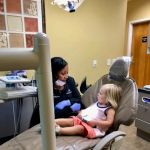Treatment for Oral Problems in Elderly Patients
Oral health is essential at every stage of life, but as we age, it becomes more important than ever to pay attention to our teeth and gums. Elderly patients often experience specific oral problems that can significantly affect their quality of life. If you're in your golden years or taking care of an elderly loved one, understanding how to treat and prevent common oral issues is crucial. In this article, we'll delve into the most common oral problems in seniors and the treatment options available to address them.
- Common Oral Problems in Elderly Patients
- Treatment Options for Elderly Oral Problems
- Preventive Measures for Maintaining Oral Health
- How to Maintain Good Dental Hygiene in Older Adults
1. Common Oral Problems in Elderly Patients
Elderly patients face a variety of oral health issues, many of which are directly linked to aging. Understanding these problems is the first step in finding effective treatment solutions. Some of the most common oral issues in elderly individuals include:
- Dry Mouth (Xerostomia): One of the most prevalent problems in older adults, dry mouth occurs when the salivary glands do not produce enough saliva. This condition can make it difficult to swallow, speak, and enjoy food. It also increases the risk of tooth decay and gum disease.
- Gum Disease: Gum disease, also known as periodontal disease, is a significant concern in elderly patients. Poor oral hygiene, medications, and certain health conditions can lead to inflammation, bleeding, and infection of the gums.
- Tooth Loss: As people age, the likelihood of losing teeth increases. This could be due to decay, gum disease, or wear and tear over the years.
- Cavities and Tooth Decay: Seniors may be more susceptible to cavities due to receding gums, dry mouth, and the use of medications that reduce saliva production.
2. Treatment Options for Elderly Oral Problems
Once the common oral problems are identified, the next step is understanding the available treatments. The following are some of the most effective options for managing and treating oral health problems in elderly patients:
- Saliva Substitutes and Oral Hydration Products: For patients suffering from dry mouth, saliva substitutes can help keep the mouth moist. Hydration products like sprays, gels, or mouthwashes can be particularly useful.
- Gum Disease Treatment: In mild cases of gum disease, regular cleaning and improved oral hygiene can suffice. For more advanced cases, a dentist may recommend scaling and root planing, which is a deeper cleaning procedure.
- Tooth Fillings and Crowns: Cavities and decay can be treated with fillings or crowns, which help restore the structure of the tooth. In severe cases, tooth extraction may be necessary.
- Partial Dentures and Implants: For seniors who have lost teeth, dentures or dental implants are viable options for replacing missing teeth and improving function.
3. Preventive Measures for Maintaining Oral Health
Prevention is always better than cure. Ensuring that elderly patients maintain good oral hygiene is essential in preventing many common dental issues. Here are some practical tips for preventing oral problems in seniors:
- Brush and Floss Regularly: Even for seniors with limited mobility or dexterity, using an electric toothbrush and flossing tools can help maintain good oral hygiene.
- Regular Dental Checkups: Regular visits to the dentist for checkups and professional cleanings can catch early signs of oral problems before they become more serious.
- Hydration: Encouraging seniors to drink water throughout the day can help combat dry mouth. Avoiding excessive caffeine or alcohol can also reduce the risk of dehydration.
- Healthy Diet: A balanced diet rich in vitamins and minerals can help strengthen teeth and gums, and reduce the risk of oral infections.
4. How to Maintain Good Dental Hygiene in Older Adults
Maintaining good dental hygiene in older adults can be challenging, but it's not impossible. There are several steps you can take to help elderly patients keep their mouths healthy:
- Use Soft-Bristled Toothbrushes: A soft-bristled toothbrush is ideal for seniors with sensitive gums and teeth. It’s gentler on the gums and prevents further irritation.
- Choose Fluoride Toothpaste: Fluoride toothpaste can help prevent cavities and protect enamel. Seniors should opt for a fluoride-based toothpaste to keep their teeth strong.
- Assist with Flossing: If necessary, assist elderly patients with flossing to ensure proper cleaning between the teeth. Special flossers designed for seniors can make this easier.
By following these steps and addressing common oral health issues proactively, elderly patients can enjoy better dental health and an improved quality of life. It’s essential to recognize the signs of oral problems early on and take steps to treat and prevent them. If you're caring for an elderly loved one, make sure they receive regular dental checkups and maintain a proper oral care routine to prevent complications.
If you're interested in learning more about senior dental care or need expert advice, don’t hesitate to visit Dentistry Toothtruth for helpful resources and services.







 BridgeMill Dentistry5.0 (401 review)
BridgeMill Dentistry5.0 (401 review) Lowery Smiles5.0 (305 review)
Lowery Smiles5.0 (305 review) Aspen Dental - Springfield, MO4.0 (563 review)
Aspen Dental - Springfield, MO4.0 (563 review) Articolo Orthodontics5.0 (4 review)
Articolo Orthodontics5.0 (4 review) Toothology5.0 (136 review)
Toothology5.0 (136 review) Skyway Dental of St Paul4.0 (97 review)
Skyway Dental of St Paul4.0 (97 review) The Importance of Oral Health Education During Pregnancy for a Healthy Pregnancy
The Importance of Oral Health Education During Pregnancy for a Healthy Pregnancy Best Tips for Brushing Your Teeth Properly for Healthy Gums: Essential Techniques for Oral Health
Best Tips for Brushing Your Teeth Properly for Healthy Gums: Essential Techniques for Oral Health Why Skipping Dental Checkups Can Lead to Bigger Oral Health Problems
Why Skipping Dental Checkups Can Lead to Bigger Oral Health Problems Advantages of Porcelain Dental Restorations
Advantages of Porcelain Dental Restorations How Can Diabetes Cause Tooth and Gum Problems? Preventing and Managing Oral Health Issues
How Can Diabetes Cause Tooth and Gum Problems? Preventing and Managing Oral Health Issues Healthy Habits for Promoting Good Oral Health and Hygiene: Tips for a Healthy Smile
Healthy Habits for Promoting Good Oral Health and Hygiene: Tips for a Healthy Smile